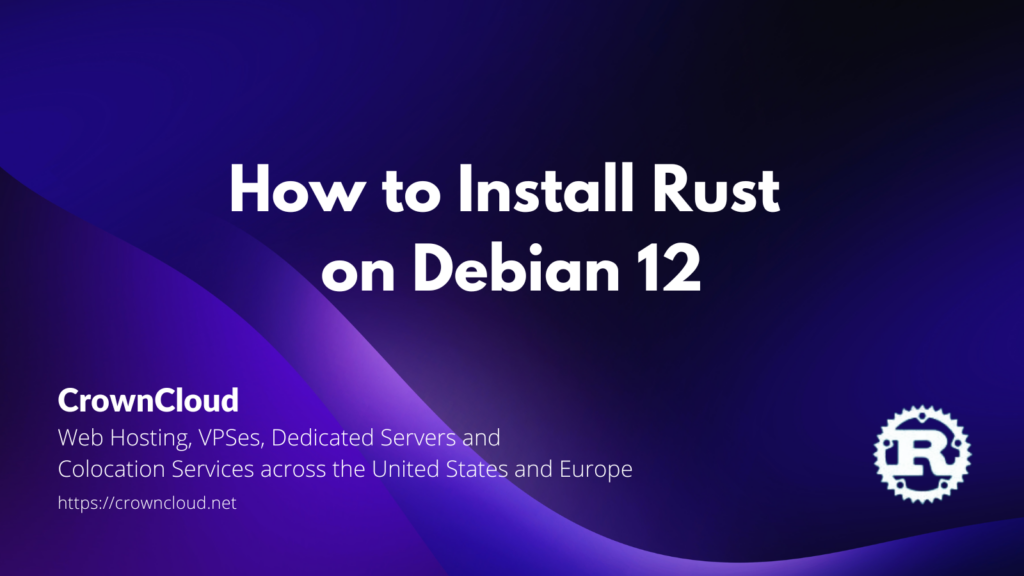Hello,
In this week’s feature highlight, we look at How to Install Rust on Debian 12

Rust is a multi-paradigm, general-purpose programming language that emphasizes performance, type safety, and concurrency. It enforces memory safety—ensuring that all references point to valid memory—without requiring the use of a garbage collector or reference counting present in other memory-safe languages.
Install Rust
Install the Rust using rustup command line tool,
Run the below command to install curl and then download the rustup command,
apt install curl -y
curl --proto '=https' --tlsv1.3 https://sh.rustup.rs -sSf | shOutput:
root@vps:~# curl --proto '=https' --tlsv1.3 https://sh.rustup.rs -sSf | sh
info: downloading installer
Welcome to Rust!
This will download and install the official compiler for the Rust
programming language, and its package manager, Cargo.
Rustup metadata and toolchains will be installed into the Rustup
home directory, located at:
/root/.rustup
This can be modified with the RUSTUP_HOME environment variable.
The Cargo home directory is located at:
/root/.cargo
This can be modified with the CARGO_HOME environment variable.
The cargo, rustc, rustup and other commands will be added to
Cargo's bin directory, located at:
/root/.cargo/bin
This path will then be added to your PATH environment variable by
modifying the profile files located at:
/root/.profile
/root/.bashrc
You can uninstall at any time with rustup self uninstall and
these changes will be reverted.
Current installation options:
default host triple: x86_64-unknown-linux-gnu
default toolchain: stable (default)
profile: default
modify PATH variable: yes
1) Proceed with installation (default)
2) Customize installation
3) Cancel installation
>
info: profile set to 'default'
info: default host triple is x86_64-unknown-linux-gnuRun the below command to add the Rust toolchain directory to the PATH environment variable,
source "$HOME/.cargo/env"Verify the Installation
Verify the Rust installation by requesting the version,
rustc --versionOutput:
root@vps:~# rustc --version
rustc 1.71.1 (eb26296b5 2023-08-03)
root@vps:~# Installing a Compiler
First, update the Apt package index using below command,
apt update
apt upgrade Once the upgrades are complete, install the build-essential package using the below command,
apt install build-essentialCreating, Compiling, and Running a Test Program, Start by creating some directories to store the test script,
mkdir ~/rustprojects
cd ~/rustprojects
mkdir testdir
cd testdirCreate a file in testdir to store your Rust code,
nano test.rsNote: You need to use the
.rsextension for all your Rust programs.
Add the following code into test.rs and save the file,
fn main() {
println!("Congratulations! You have installed your Rust program and it works.");
}Compile the code using the rustc command,
rustc test.rsRun the resulting executable,
./testOutput:
root@vps:~/rustprojects/testdir# ./test
Congratulations! You have installed your Rust program and it works.
root@vps:~/rustprojects/testdir# Use the below command to update the rustup,
rustup updateOutput:
root@vps:~/rustprojects/testdir# rustup update
info: syncing channel updates for 'stable-x86_64-unknown-linux-gnu'
info: checking for self-update
stable-x86_64-unknown-linux-gnu unchanged - rustc 1.71.1 (eb26296b5 2023-08-03)
info: cleaning up downloads & tmp directories
root@vps:~/rustprojects/testdir# Done, you’ve installed and tested out Rust on Debian 12.